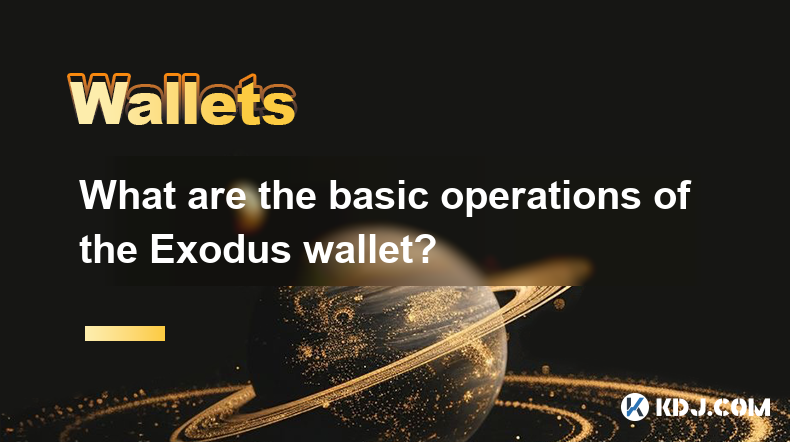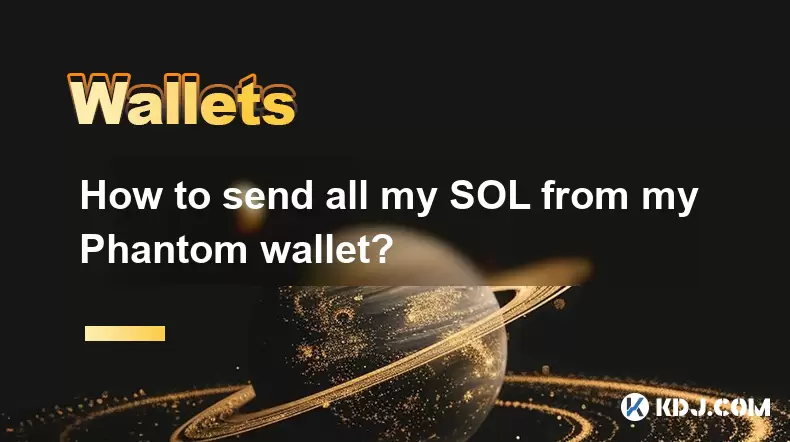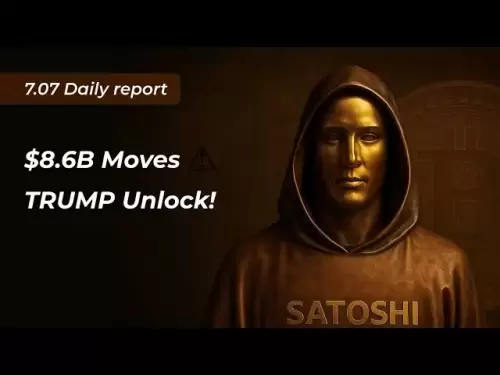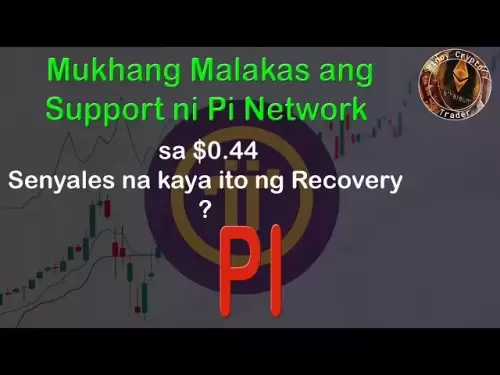-
 Bitcoin
Bitcoin $108,980.7358
0.74% -
 Ethereum
Ethereum $2,571.0926
1.93% -
 Tether USDt
Tether USDt $1.0002
-0.02% -
 XRP
XRP $2.2667
1.60% -
 BNB
BNB $661.7100
0.93% -
 Solana
Solana $151.4189
2.27% -
 USDC
USDC $1.0000
-0.01% -
 TRON
TRON $0.2878
1.42% -
 Dogecoin
Dogecoin $0.1739
6.04% -
 Cardano
Cardano $0.5858
1.83% -
 Hyperliquid
Hyperliquid $39.9185
2.35% -
 Sui
Sui $2.9139
0.69% -
 Bitcoin Cash
Bitcoin Cash $497.2075
2.19% -
 Chainlink
Chainlink $13.6101
2.97% -
 UNUS SED LEO
UNUS SED LEO $9.0469
0.30% -
 Stellar
Stellar $0.2510
5.54% -
 Avalanche
Avalanche $18.2271
1.85% -
 Toncoin
Toncoin $2.8336
3.53% -
 Shiba Inu
Shiba Inu $0.0...01179
3.07% -
 Hedera
Hedera $0.1595
4.34% -
 Litecoin
Litecoin $87.7262
0.69% -
 Monero
Monero $320.3380
1.76% -
 Polkadot
Polkadot $3.4007
1.84% -
 Dai
Dai $1.0000
-0.01% -
 Ethena USDe
Ethena USDe $1.0000
-0.04% -
 Bitget Token
Bitget Token $4.4321
1.03% -
 Uniswap
Uniswap $7.4250
1.33% -
 Aave
Aave $286.5818
5.00% -
 Pepe
Pepe $0.0...01014
5.26% -
 Pi
Pi $0.4652
3.86%
What are the basic operations of the Exodus wallet?
Exodus Wallet simplifies crypto management with its intuitive interface. Basic operations include sending/receiving crypto via copy-pasted addresses, portfolio tracking, and utilizing integrated exchange features; security relies on 2FA and optional hardware wallet integration.
Mar 22, 2025 at 02:36 am

Key Points:
- Exodus Wallet's user interface is intuitive, making navigation and basic operations straightforward.
- Sending and receiving cryptocurrencies involves simple copy-pasting of addresses and specifying amounts.
- Managing your portfolio requires understanding the display of asset holdings and their value.
- Security features like hardware wallet integration and 2FA are crucial to understand and implement.
- The wallet's exchange functionality allows for direct trades within the application.
What are the basic operations of the Exodus wallet?
Exodus is a popular multi-currency wallet known for its user-friendly interface. This guide outlines its basic operations, covering sending and receiving crypto, managing your portfolio, security features, and using the built-in exchange. Understanding these basics is crucial for securely managing your cryptocurrency holdings within the Exodus ecosystem.
Sending Cryptocurrency:
Sending cryptocurrency from your Exodus wallet is a relatively simple process. First, locate the specific cryptocurrency you wish to send within your portfolio view. Then, click on the "Send" button associated with that asset. You'll need to enter the recipient's wallet address and the amount you wish to send. Double-check all details before confirming the transaction. Remember transaction fees are usually involved.
Receiving Cryptocurrency:
Receiving cryptocurrency is even simpler. Each cryptocurrency within your Exodus wallet has a unique receiving address. You can find this address by selecting the specific asset and choosing the "Receive" option. Share this address with the sender. Once the sender initiates the transaction, you'll see it reflected in your wallet after confirmation on the blockchain.
Managing Your Portfolio:
Exodus displays your portfolio clearly, showing the different cryptocurrencies you hold, their current value, and overall portfolio value. You can easily track your assets' performance over time. Understanding this view allows you to monitor your investments and make informed decisions about your holdings. The portfolio view is dynamically updated based on market prices.
Security Features in Exodus Wallet:
Security is paramount when managing cryptocurrency. Exodus offers several security features. One important feature is the option to enable two-factor authentication (2FA), adding an extra layer of protection against unauthorized access. You should always enable this feature. Exodus also supports integration with hardware wallets like Trezor and Ledger, providing an even higher level of security for your private keys.
Using the Exodus Built-in Exchange:
Exodus offers a built-in exchange feature allowing you to trade various cryptocurrencies directly within the wallet. This simplifies the process of converting between different assets. The exchange interface is user-friendly, showing current market prices and allowing you to specify the amount you wish to trade. Remember to review the exchange fees before completing any trade. The exchange utilizes third-party providers, so understanding their terms is important.
Backing Up Your Wallet:
It's crucial to back up your Exodus wallet. This ensures you can recover your assets if your device is lost or damaged. Exodus provides a seed phrase, a list of words that acts as a master key to your wallet. This seed phrase must be stored securely and offline. Never share it with anyone. Losing your seed phrase means losing access to your funds.
Understanding Transaction Fees:
Transaction fees are essential to understand. These fees are charged by the blockchain network for processing transactions. The fee amount varies depending on network congestion. Exodus usually provides an estimate of the transaction fee before you confirm the transaction. It's important to note that higher fees generally result in faster transaction confirmations.
Troubleshooting Common Issues:
Occasionally, you might encounter issues with your Exodus wallet. Common problems include slow transaction confirmations or difficulty accessing your wallet. If you face such problems, consult Exodus's support documentation or contact their customer support team. They offer resources and assistance to address most issues users encounter.
Frequently Asked Questions:
Q: Is Exodus Wallet safe?
A: Exodus prioritizes security but, like any digital wallet, it’s vulnerable to risks if not used properly. Utilizing 2FA and a hardware wallet significantly enhances security. Always keep your seed phrase safe and secure.
Q: What cryptocurrencies does Exodus support?
A: Exodus supports a wide range of cryptocurrencies, regularly adding new ones. Check their website for the most up-to-date list of supported assets. The supported coins change over time.
Q: How do I recover my Exodus wallet if I lose my device?
A: If you've securely stored your 12-word seed phrase, you can recover your wallet on a new device using that phrase. Without it, recovery is not possible.
Q: Are there any fees associated with using Exodus?
A: Exodus itself doesn't charge fees for using its core functionality. However, network transaction fees apply when sending cryptocurrency. The exchange also has its own fees.
Q: Can I use Exodus on multiple devices?
A: You can access your Exodus wallet on multiple devices, but it's essential to understand that your seed phrase is the key to all instances of your wallet. Keep it secure.
Disclaimer:info@kdj.com
The information provided is not trading advice. kdj.com does not assume any responsibility for any investments made based on the information provided in this article. Cryptocurrencies are highly volatile and it is highly recommended that you invest with caution after thorough research!
If you believe that the content used on this website infringes your copyright, please contact us immediately (info@kdj.com) and we will delete it promptly.
- Drake, Bitcoin, and Mainstream Music: A New Era?
- 2025-07-07 12:30:12
- Meme Coins, ROI Potential, 2025 Selection: What's Hot and What's Not?
- 2025-07-07 12:30:12
- Bitcoin, Ethereum, and Dogecoin: Navigating the Crypto Landscape in a Wild Week
- 2025-07-07 12:50:11
- Meme Coin Mania: Explosive Picks and Top Buys in 2025
- 2025-07-07 12:50:11
- Bitcoin, Ethereum, and the Cryptocurrency Market: Riding the Wave of Innovation
- 2025-07-07 12:55:12
- Elon Musk, Bitcoin, and Crypto News: A 2025 Perspective
- 2025-07-07 13:10:12
Related knowledge

How to cancel a pending transaction in Phantom wallet?
Jul 03,2025 at 07:21pm
Understanding Pending Transactions in Phantom WalletA pending transaction in the Phantom wallet occurs when a user initiates a transfer or interaction with the Solana blockchain, but it hasn't yet been confirmed by the network. This can happen due to various reasons such as low transaction fees, network congestion, or incorrect gas settings. It's import...

How to see the estimated value of my tokens in Phantom wallet?
Jul 04,2025 at 12:21am
What is Phantom Wallet?Phantom wallet is one of the most popular cryptocurrency wallets designed for the Solana blockchain. It allows users to store, send, receive, and manage various tokens built on Solana, including SPL tokens and NFTs. The wallet offers a user-friendly interface, making it accessible for both beginners and advanced users in the crypt...

How to lock my Phantom wallet extension?
Jul 03,2025 at 11:14am
What Is the Phantom Wallet and Why Lock It?The Phantom wallet is a popular non-custodial cryptocurrency wallet designed for interacting with the Solana blockchain. Supporting both browser extensions and mobile apps, Phantom allows users to store, send, receive, and stake SOL tokens, as well as interact with decentralized applications (dApps). Securing y...

Does Phantom wallet offer two-factor authentication (2FA)?
Jul 03,2025 at 09:00am
Understanding Phantom Wallet and Its Security FeaturesPhantom wallet is a widely used non-custodial cryptocurrency wallet that supports the Solana blockchain. It allows users to store, send, receive, and interact with decentralized applications (dApps) seamlessly. As security is a top priority for any crypto wallet user, security features like two-facto...

How to send all my SOL from my Phantom wallet?
Jul 06,2025 at 10:00am
Preparing to Send SOL from Your Phantom WalletBefore initiating any transaction, it is crucial to ensure that your Phantom wallet is fully set up and connected to the correct network. Phantom supports multiple networks, but for sending SOL, you must be on the Solana blockchain. Confirm this by checking the network indicator in the top-right corner of th...

What is "rent" on Solana and how does it affect my Phantom wallet?
Jul 02,2025 at 08:35pm
Understanding 'Rent' on SolanaIn the context of Solana, the term 'rent' refers to a storage fee that users pay for maintaining data on the blockchain. Unlike Ethereum, where storage costs are paid once via gas fees during contract deployment, Solana implements a recurring cost model to ensure efficient usage of network resources. This means that any acc...

How to cancel a pending transaction in Phantom wallet?
Jul 03,2025 at 07:21pm
Understanding Pending Transactions in Phantom WalletA pending transaction in the Phantom wallet occurs when a user initiates a transfer or interaction with the Solana blockchain, but it hasn't yet been confirmed by the network. This can happen due to various reasons such as low transaction fees, network congestion, or incorrect gas settings. It's import...

How to see the estimated value of my tokens in Phantom wallet?
Jul 04,2025 at 12:21am
What is Phantom Wallet?Phantom wallet is one of the most popular cryptocurrency wallets designed for the Solana blockchain. It allows users to store, send, receive, and manage various tokens built on Solana, including SPL tokens and NFTs. The wallet offers a user-friendly interface, making it accessible for both beginners and advanced users in the crypt...

How to lock my Phantom wallet extension?
Jul 03,2025 at 11:14am
What Is the Phantom Wallet and Why Lock It?The Phantom wallet is a popular non-custodial cryptocurrency wallet designed for interacting with the Solana blockchain. Supporting both browser extensions and mobile apps, Phantom allows users to store, send, receive, and stake SOL tokens, as well as interact with decentralized applications (dApps). Securing y...

Does Phantom wallet offer two-factor authentication (2FA)?
Jul 03,2025 at 09:00am
Understanding Phantom Wallet and Its Security FeaturesPhantom wallet is a widely used non-custodial cryptocurrency wallet that supports the Solana blockchain. It allows users to store, send, receive, and interact with decentralized applications (dApps) seamlessly. As security is a top priority for any crypto wallet user, security features like two-facto...

How to send all my SOL from my Phantom wallet?
Jul 06,2025 at 10:00am
Preparing to Send SOL from Your Phantom WalletBefore initiating any transaction, it is crucial to ensure that your Phantom wallet is fully set up and connected to the correct network. Phantom supports multiple networks, but for sending SOL, you must be on the Solana blockchain. Confirm this by checking the network indicator in the top-right corner of th...

What is "rent" on Solana and how does it affect my Phantom wallet?
Jul 02,2025 at 08:35pm
Understanding 'Rent' on SolanaIn the context of Solana, the term 'rent' refers to a storage fee that users pay for maintaining data on the blockchain. Unlike Ethereum, where storage costs are paid once via gas fees during contract deployment, Solana implements a recurring cost model to ensure efficient usage of network resources. This means that any acc...
See all articles

























































































